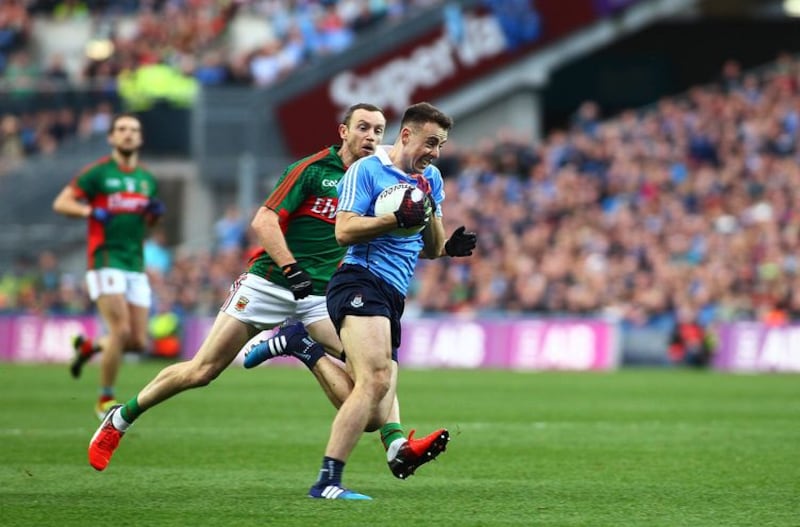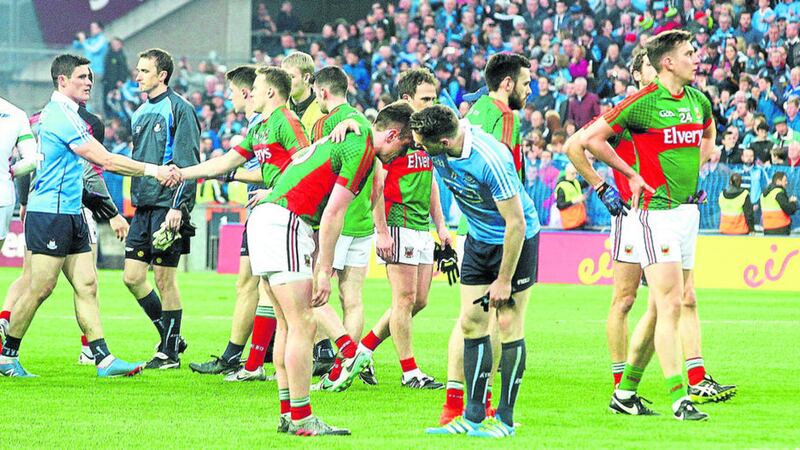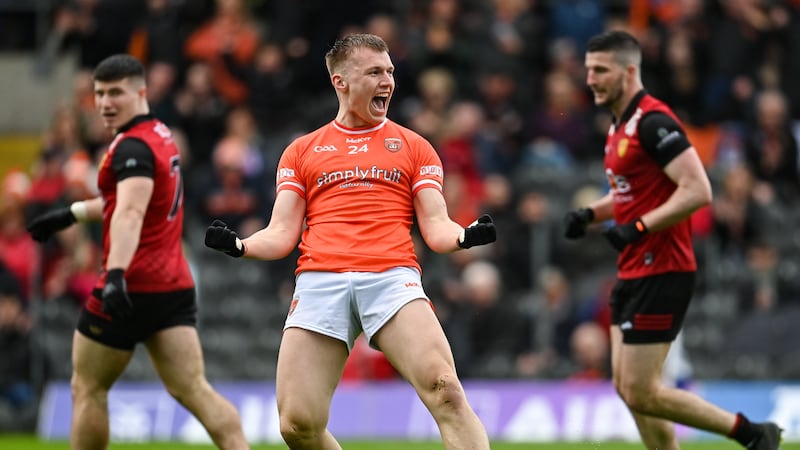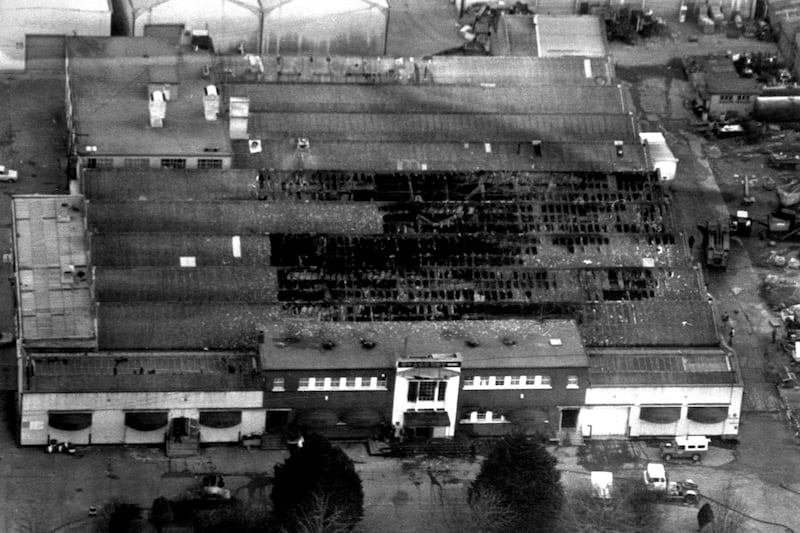AND so it ends just like most of us thought it would at the start of the season, but how close Mayo came to finally laying to rest their All-Ireland final hoodoo.
Make no mistake, however, Mayo left this one behind them. Following last Saturday’s replay, I had very mixed emotions on my way home - total sympathy for the losers and tremendous admiration for the winners. Victory, they say, belongs to those who believe in it most, those who believe in it longer and last Saturday’s game demonstrated this more than ever.
To properly analyse the game, we have to start with Mayo. I questioned whether they could get more from Aidan O’Shea and the O’Connor brothers following the drawn final because I didn’t feel their attacking threat could get them across the finish line.
It had to change for the replay but, regrettably for Mayo, it didn’t. O’Shea, Cillian O’Connor, Andy Moran and Diarmuid O’Connor are all very talented footballers, but their combined tally from play of 0-2 was a poor return from an experienced forward line that needed to deliver on the biggest of occasions.
So often, they had opportunities to get a shot away and hesitated, taking an extra split-second or another touch and closing the door on themselves. How they will wish they’d just taken the chance when it was there.
Stephen Rochford’s decision to replace goalkeeper David Clarke with Robbie Hennelly has dominated the fall-out from last Saturday’s game. On reflection, it was the wrong call, but I admire Rochford for having the guts to make the decision.
Bear with me here. Management at the highest level is all about making the tough calls. Rochford has looked at the evidence before him and weighed it up. He will have asked for the views of his backroom team, he will have closely watched the two players in training and, at some point in the process, he will have been tempted to shirk the decision and go with the safe call in case it turns out to be wrong.
But Rochford knew Hennelly’s kick-outs had more length and could bring the O’Sheas into the game. He also knew Dublin’s high pressure on his defenders in the previous game had Mayo living on edge. He had the courage to take the risk and go with his gut. Managers live and die by tough calls and their players look to them to be brave and decisive. Unfortunately on this occasion, the call didn’t come off.
Jim Gavin also took risks last Saturday, making tough calls based on intuition that didn’t initially work out for his side. Replacing Bernard Brogan and Michael Darragh Macauley with Paddy Andrews and Paul Mannion was very brave, a decision that could have haunted him, as neither player really caught fire and showed they warranted their inclusion ahead of the marquee players they replaced.
However, it just shows the fine line between success and failure because one of the key reasons why this titanic tussle tilted in Dublin’s favour was the performance of Michael Fitzsimons. The corner-back nullified Mayo’s long pass to Andy Moran, winning man-of-the-match and, in the process, robbing Mayo of a key tactic. By trusting Fitzsimons to deliver, Gavin turned a major area of strength for Mayo into a redundant threat.
Like a poker player with more than one ace in the hole, the Dublin boss also knew he had seasoned warriors, players he had dropped, ready to spring from the bench when the game became stretched in the final-quarter.
These players made immediate impacts, with Brogan and Macauley linking up for a vital score following their introduction and Davy Byrne more than making up for the loss of the imperious Jonny Cooper at full-back.

Picture by Séamus Loughran Cormac Costello's composure once introduced last Saturday was astounding
Picture by Séamus Loughran
It was another change, however, that had the most telling impact and also gave us a glimpse into the Dublin psyche. Entering the fray with just 20 minutes left, Cormac Costello had a significant impact. His hat-trick of well-taken points in the frenetic closing stages made me wonder how on earth someone could show so much composure after playing so little this season.
My detective skills quickly led me to a major clue during his post-match interview as he said simply he “trusted the process”. What did he mean by this? Well, "the process" is something we’ve heard Jim Gavin allude to before. It never changes for this Dublin side - show up and train hard, play hard, receive feedback, press into the discomfort zone to make yourself better.
The process is all about doing the simple things right, sticking to the gameplan, having faith in one another and being part of the ‘culture system’ Gavin speaks so regularly of when referring to his team’s winning ethos.
The continual discipline of delivering on the big stage and striving for improvement has changed this Dublin team from one which underachieved constantly to one of the greatest in the history of the GAA. I’m sure they have exceeded even their own expectations with four All-Ireland titles in six years in the most competitive environment the GAA has ever known. Costello trusted himself, he trusted the process this side lives by and the rest, as they say, is history.
One other thing last Saturday’s final - and the last six weeks in general - taught us is that, while Dublin are the victors on this occasion, the gap between them and the other top teams in the country is not quite as big as we’ve been led to believe.
The last few weeks have showcased all that is good about our inter-county game, with one aspect being more important than any other. Dublin’s experience, composure and work ethic continues to get them over the line, but Mayo and Kerry have shown us there is still life out there.
As both teams proved, if you put in the work, match their athleticism, go man-for-man and take them on, you can cause problems for Dublin. Other counties must follow suit and start to trust and express themselves in a positive way.
Far too often we see teams raising the white flag before the battle has even begun, letting Dublin come at them, surrendering before even making a stand. The only way anyone will beat Dublin is to approach the game as Mayo and Kerry did.
This will give the rest at least a bit of a chance.








